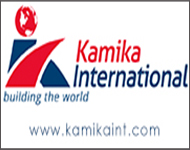The Board of Directors of the African Development Bank Group (AfDB) has approved a $109 million) loan to Uganda to finance the Road Sector Support Project V aimed at supporting the realization of the National Development Plan (NDP) and Vision 2040. One of the major roads to be upgraded is the Rukungiri-Kihihi-Ishasha/Kanungu road in Prime Minister Amama Mbabazi's home area.
Last month, angry residents hit out at Mbabazi over the road at a function in Kanungu, which President Museveni was invited to but did not attend.
But that road is only one the projects that the loan will help to finance. The AfDB said in a release that the project's objective is to improve road access to socio-economic facilities and quality of transport service levels in south-western and eastern parts of Uganda by upgrading them from gravel to bitumen standard. Consequently, it will help to improve standards of living of the beneficiaries, support the tourism activities at Queen Elizabeth National Park (QENP) and Mount Elgon National Parks, and promote regional integration and cross border trade with the DR Congo and Kenya at Ishasha and Lwakhakha respectively. The combined total population of the four project districts is estimated at one million people.
The expected project outcomes are reduction in transport costs; increased mobility; improved access to economic and social facilities; provision of clean water to households; and increase in income of women vendors in the roadside markets.
Amadou Oumarou, the AfDB's director for transport and ICT, said: "With this project, the AfDB is addressing a pressing demand for the provision of good quality and reliable transport infrastructure needed by Uganda for its socio-economic development and poverty reduction agenda."
The AfDB says the project conforms to their key development policies and its assistance strategy to Uganda and is in line with their 2011-2015 Results Based Country Strategy Paper (CSP) that focuses on infrastructure for development and increased agriculture productivity. The CSP is closely aligned to Uganda's NDP that includes infrastructure as one of the five critical pillars, and is in line with the Bank's Ten-Year Strategy (2013-2022), which prioritizes support to infrastructure development as one of the key areas for the AfDB's future assistance.
According to studies done for the project, the project areas have, on average, a female population of 51.5%. During operation, the project results are expected to deal with some of the challenges faced mostly by women. Most importantly, the reduction in travel time will enable emergency cases, including those related to maternity cases, reach health facilities in a timely manner, with the expected 20% reduction in number of maternity emergencies. Available transport such as mini-buses as opposed to motorcycles will enable girls access secondary schools with a potential for achieving 95% secondary school enrolment ratio female to male. The improvement of the roadside markets, which are mostly patronized by women (60%), will result in increased income opportunities for women, and contribute to a 30% reduction in transport costs.
In his State of the Nation Address on June 5, President Yoweri Museveni said none of the sectors of the economy can grow if the issue of infrastructure ─ the roads, electricity, the railway, the ICT backbone, etc is not addressed. Indeed, he said in the budget of 2013/014, Roads and Energy accounted for an unprecedented Shs 4.18 trillion.
The AfDB funding comes on the heels of the recently-released African Construction Trends Report 2013, which noted that Eastern Africa is the second biggest holder of infrastructure projects after Southern Africa.
Museveni said infrastructure in many parts of the country was improving, such as: the tarmac roads, the electricity, the telephones, etc and that going forward the government was negotiating with Japan International Co-operation Agency (JICA) to buy Japanese earth-moving equipment for both roads and water excavation on a large scale instead of having to depend solely on private companies. "Once this deal goes through, it will help us with the roads, water excavation for earth dams and even bush clearing. The Japanese equipment is very good. I have seen its capacity on my own farms," Museveni said.
Dan Alinange, the Uganda National Road Authority (UNRA) publicist, told the Independent in a recent interview that the delay on the Kanungu road project was occasioned by the "vagaries" of donor-funded projects, which have to comply with both Uganda's procurement requirements and those of the donor, all of which take time. He said now that all have been sorted, construction works are set to start in the next few months. The AfDB is one of the leading funders of the road sector in Uganda. Other projects being supported by the Bank include; Fort Portal - Bundibugyo-Lamia Rd, the Nyakahita- Ibanda to Kamwenge (153km); Gayaza - Kalagi (20km), Hoima - Masindi - Kigumba (87km) and Ntungamo - Miriama Hills (37km); among other projects.
Source : allafrica.com





















